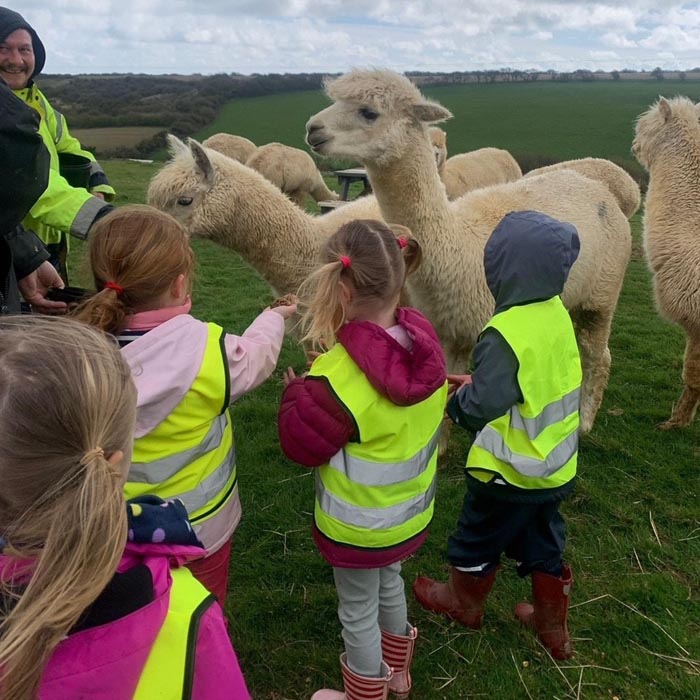3 routes to choose from
1) Therapeutic Animal Care - offers a calming, one-hour session on the farm, where you can get up close to the animals in a relaxed and peaceful environment. During this time, you may have the opportunity to: Brush cows or goats, offering a soothing experience for both you and the animals. - Walk goats or alpacas around the farm, building a bond with them as you enjoy the outdoors. - Sit with the animals, simply spending time with them and observing their natural behaviours. - Watch the animals interact and play, enjoying their company in a stress-free setting. - Pet and engage with the animals in a way that promotes relaxation and connection. This therapeutic approach is ideal for those seeking a gentle, low-pressure interaction with animals, helping to improve emotional wellbeing.
2) Semi-Therapeutic / Educational Nature-Based - sessions last for two hours, providing a more active and educational experience on the farm. During this time, you'll: - Assist the farmer with preparing food and feeding some of the animals, helping to ensure their care and wellbeing. - Work with a different group or individual animal each week, allowing you to learn more about the specific needs and characteristics of various animals. - Spend time brushing, walking, and playing with the animals, developing a deeper connection and understanding of their behaviour. - Engage in small horticultural tasks, such as sowing seeds, planting, watering, or even harvesting crops, giving you hands-on experience with the farm’s garden and produce. This session offers a balanced mix of animal care and nature-based education, helping to develop practical skills and learn about farming and gardening, all while benefiting from the therapeutic effects of nature.
3) Farming - Educational-Based- sessions are designed for those looking to get hands-on with the day-to-day running of the farm. These sessions typically last for 2 or more hours and involve a variety of tasks that are integral to farm life. During this time, you'll: - Assist with feeding the animals and mucking out, ensuring they are well cared for. - Help with poo picking and maintaining clean, healthy environments for the animals. - Take part in erecting fences, moving animals between different areas, and assisting with general animal husbandry. - Get involved in planting trees, sowing seeds, and caring for crops as part of the farm’s horticultural activities. - Experience harvesting produce and preparing it for sale or consumption, learning about sustainable farming practices and how to manage a farm effectively. This educational-based session is ideal for anyone wanting to learn about the full scope of farming activities, from animal care to agriculture, and is perfect for developing practical skills in a real-world setting.
All of our programmes are carefully tailored to each young person’s unique learning style and needs. Whether they are working towards specific educational, social, or emotional goals, we adapt our sessions to ensure that every individual can thrive in a supportive and engaging environment. Our aim is to create a positive, hands-on experience that helps each participant achieve their personal outcomes, whether through animal care, horticulture, or other farm-based activities. Each session is flexible and adjusted as needed, ensuring that everyone is able to progress at their own pace and in a way that suits them best.
Studies have consistently shown that spending time with animals and being immersed in nature can have profound therapeutic effects, particularly for children and teenagers with additional needs. The physical activity, emotional connection, and sensory experiences involved in animal care and outdoor activities can help reduce anxiety, improve mood, and enhance social skills. It also promotes self-esteem and confidence as individuals engage in tasks that provide a sense of achievement and purpose. Nature, with its calming and restorative qualities, serves as a natural environment for healing and personal growth.











